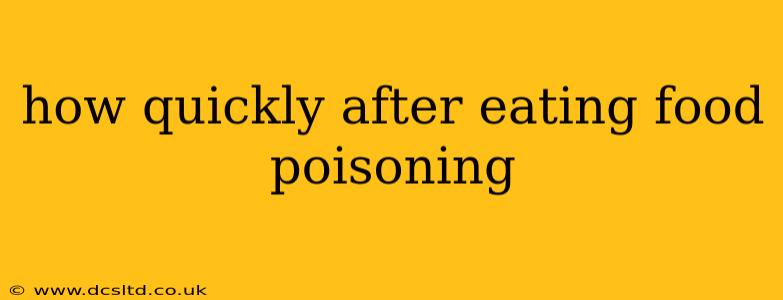How Quickly After Eating Can Food Poisoning Symptoms Appear?
Food poisoning, also known as foodborne illness, can manifest in a variety of ways and at different speeds depending on several factors. There's no single answer to how quickly symptoms appear after eating contaminated food, as the incubation period – the time between ingestion and symptom onset – varies greatly depending on the type of pathogen involved and individual susceptibility.
Understanding the timeframe is crucial for seeking timely medical attention and preventing further complications. Let's delve into the common scenarios:
How long does it take for food poisoning to start?
The incubation period for food poisoning can range from a few hours to several days. Some bacteria and toxins cause rapid-onset symptoms, while others may take longer to produce enough toxins to cause illness. This delay is often determined by the pathogen's multiplication rate and the person's immune response.
Common culprits and their typical incubation periods:
- Staphylococcus aureus (Staph): This bacterium produces a toxin that causes symptoms in as little as 30 minutes to 6 hours after consuming contaminated food. Symptoms are often short-lived, lasting less than 24 hours.
- Salmonella: Symptoms typically appear between 6 and 72 hours after eating contaminated food. The severity and duration vary, but it often resolves within a week.
- Campylobacter: The incubation period for Campylobacter ranges from 2 to 5 days but can sometimes be as short as a few hours or as long as 10 days.
- E. coli (Escherichia coli): The incubation period for E. coli varies greatly depending on the strain. Some strains cause diarrhea within 1 to 8 days after exposure, while others may take much longer.
- Norovirus: This highly contagious virus has an incubation period of 12 to 48 hours. Symptoms are often severe and can include vomiting and diarrhea.
What are the common symptoms of food poisoning?
Symptoms of food poisoning can vary widely but commonly include:
- Nausea
- Vomiting
- Diarrhea
- Stomach cramps
- Fever
- Headache
- Muscle aches
- Dehydration
The severity of symptoms can range from mild discomfort to severe illness requiring hospitalization. Severe dehydration is a particular concern, especially in young children, the elderly, and individuals with weakened immune systems.
What should I do if I think I have food poisoning?
If you suspect you have food poisoning, it's important to:
- Stay hydrated: Drink plenty of clear fluids like water, broth, or electrolyte solutions to replace lost fluids.
- Rest: Your body needs rest to fight off the infection.
- Avoid certain foods: Steer clear of fatty or greasy foods, dairy products, and caffeine until your symptoms improve.
- Monitor your symptoms: If your symptoms worsen or persist for more than a few days, seek medical attention. Severe cases of food poisoning can be life-threatening, especially if dehydration develops.
Can I tell what caused my food poisoning?
Pinpointing the exact source of food poisoning can be difficult, as symptoms may not appear immediately. However, tracking what you ate in the hours leading up to the onset of symptoms can help you identify potential culprits. Consider keeping a food diary to aid in this process. This information can be helpful if an outbreak is suspected.
How long does food poisoning last?
The duration of food poisoning symptoms can vary widely depending on the causative agent and your individual health. Most cases resolve within a few days, but some infections can last for a week or longer. If symptoms persist or worsen, it's crucial to consult a doctor.
This information is for educational purposes only and should not be considered medical advice. Always consult a healthcare professional for diagnosis and treatment of any medical condition.
